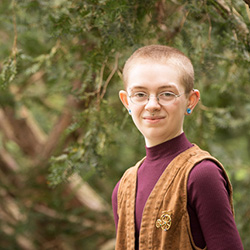Orange Season
In the future, we volunteer at the produce-distribution collective because we feel like it and because we really should and because we enjoy the smell of early-summer oranges as they roll toward us in great, eponymous tidal waves. Each has just been plucked by volunteers next door, who work in half-hour rotations so as not to succumb to the brutal May heat.
The fruits grow farther north, now. The climate crept up here and we early waited too late to stop it—we, meaning they, the “they” for whom we take responsibility, whose mess we work to rectify. While sweet Valencias ripen close to home, we childrens’ childrens’ children are somehow still alive. In the future, today, we place May fruits—oranges, lemons, grapefruit—into crates by genre. We do not delineate between beautiful and ugly, but only between ripe and not-yet. The not-yet remain on the trees and all the ripe—the small, misshapen, the large, the in-between and the anomalous—wander equal into our hands.
In the future, because this is the future and we childrens’ childrens’ children have learned better, we waste no strangeness. We do not cover it in turf grass, and we have mapped a new vegetal terrain in place of sprawling homes. The center, an open-air, solar-powered space, contains strategically-placed windows designed to facilitate a pleasant cross-breeze amid the blazing heat. It does not fix the 102º days, but it mitigates them.
We people, set on survival
against our parents’ parents’ parents.
Another batch of oranges rolls toward us, sparking a citrus-something in my nose. My partner, gloved like me in last month’s plastic now-transformed, plucks an orange from the crowd. It has legs. Its circular body turns pointy, and from two parallel places at its base sprout limbs of equivalent length to its body. Each limb is plump as if inflated, curving delicately inward.
They hold the orange up to the sun, which shines down through a UV-proofed skylight. “Even after everything, I feel like this would still freak them out a little,” my partner says. Those who rarely volunteered in distribution and did not know quite how normal abnormal fruit could be. Turning the fruit in their hands, first gripping its rounded shape and then pinching the end of a leg, my partner lets its fat body hang.
When they gesture toward me, I take the other leg. We pull the two apart like a wishbone. The remainder lands on the counterful of fruit between us.
“If you wanted a snack break, you could have just said so,” I tell them. Breaks no longer require excuses and food no longer costs money. There is no shortage when there is no waste.
“I’m not really hungry. I just want to know the taste,” they reply, peeling back a leg of fruit and popping the remains into their mouth. I do the same and chew slowly. (In the future, breaks also have no borders.) It tastes orange as does every other orange, bitter at its pointed toes which turn from fruit to fiber.
My partner halves the remainder of the orange, popping another section into their mouth with eyes shut. Looks aside, the fruit was sweet and juicy, picked at perfect ripeness. I close my eyes as well. We stand silently for a moment, chewing into the backs of our eyelids, until the sound of the monorail outside returns us to our task. We hear the volunteers’ laughter on their way into the center, the sound of scraping crates as they heave them into the monorail for community-distribution. When they are finished, several come inside to talk, and we tell them of our perfect mutant fruit, all the way up here in Massachusetts, and we laugh together, sad and hopeful. When my partner and I reenact our wishbone-pull, they laugh again, only out of joy.
As the sun’s gaze relents behind the evening we remain among the fruit, until the next shift greets us. Another monorail will arrive soon. Though hot during the day, there remains a chill in the air at night, promising wind against my hands still damp with juice.

Sarah Cavar is a student and writer of indeterminate gender. A 2020 graduate of Mount Holyoke College, they are now pursuing a PhD in cultural studies at UC Davis. Find Cavar’s work in Vulture Bones, The Offing, Electric Literature, and elsewhere. They read for Stone of Madness Press, tweet @cavarsarah, blog at sarahcavar.wordpress.com, and definitely haunt your local library.

